Netaji Subhash Chandra Bose was one of the most prominent Indian Nationalist and freedom fighters of India who played a significant role in the freedom movement of India. He is also credited with the formation of the Azad Hind Force that fastened the process of freedom movement in India. His unshakable resolve, steadfast passion, and commitment to the cause have made a lasting impression on the history of the country.
Netaji Subhash Chandra Bose
There aren’t many historical figures in India as prominent as Subhas Chandra Bose. Bose, who is known as “Netaji” or the leader, won the respect and affection of the country for his unshakable commitment to India’s freedom. Though his undying patriotism continues to be an unquestionable source of inspiration, his wartime connections, daring escape from house arrest, and command of the Azad Hind Fauj (Indian National Army) continue to spark discussion.
During the fight for Indian independence from British colonial control, Subhash Chandra Bose was initially given the nickname “Netaji” by Indian soldiers of the Azad Hind Fauj (Indian National Army). The Hindi words “Neta,” which means leader, and “Ji,” which means with respect, are combined to form the name “Netaji”. To learn from the life and struggles of such a great leader, students are asked to research about him and write an essay on him. That is why, below we have provided essays on Netaji Subhash Chandra Bose in both English and Hindi.
Subhash Chandra Bose Essay in 100 Words
Millions of Indians lovingly refer to Subhash Chandra Bose as “Netaji,” who was a political figure and a revered liberation warrior. Netaji was a member of the Indian National Congress since his early manhood and served as its president twice.
Due to his practically violent approach against the British Empire and its Indian supporters, Netaji had significant opponents while he was in India. Throughout his life, Netaji made a valiant effort to enlist the support of supporters worldwide in the struggle for Indian independence. Though he had both successes and failures, he left a patriotic and nationalistic legacy that would serve as an inspiration to many future generations.
Subhash Chandra Bose Essay in English 150 Words
One name that sticks out in the glories of India’s freedom movement is Subhash Chandra Bose. He was a man of extraordinary nationalistic and patriotic passion. Millions of Indians, particularly young people, looked up to, adored, and admired Netaji as an inspiration and a beacon of hope. Millions of people witnessed the advent of a new India under Netaji, one that was autonomous.
Bose was a longtime associate of the Congress and its president twice over. But because of disagreements with Mahatma Gandhi and other party members, he resigned as president. Bose intended to promote a change that would make the Congress more forceful in its policies since he was against the Congress’s soft attitudes toward the British. This went against Mahatma Gandhi’s policies and subsequently attempted to quell Bose’s ambitions.
Nevertheless, in spite of all the odds, Bose achieved great success and nearly brought independence to India; sadly, on August 18, 1945, at the age of 48, he was killed in an aircraft crash.
Subhash Chandra Bose Essay in English 200 Words
Indian independence warrior Subhash Chandra Bose is revered as a national hero for his exceptional patriotism. Bose, who was born on January 23, 1897, into a prosperous family, had a good education. In 1921, he was also chosen for the prestigious Indian Administrative Services (IAS), also known as the Indian Civil Services (ICS). He did, however, leave ICS that same year after working there for a short time because he thought it was wrong to work for the British. He stated, “Only on the soil of sacrifice and suffering can we raise our national edifice,” in a letter to his brother Sarat Chandra Bose.
In doing so, he bravely left ICS to join the Indian liberation movement and made many sacrifices and sufferings. From January 1939 until January 1941, he was the President of the Indian National Congress twice, and he continued to be involved in politics. After that, in April 1939, he resigned as President of the Congress due to ideological disagreements with Mahatma Gandhi.
Subhash Chandra Bose established “The Forward Bloc,” a distinct party within the Congress, following his resignation. Its primary goal was to bring the left and other forces together in the struggle for India’s independence. He is also remember for slogans like “Dilli Chalo” and “Tum Mujhe Khoon Do, Mai Tumhe Azadi Dunga”.
Essay on Subhash Chandra Bose in 250 Words
Indian freedom warrior Subhash Chandra Bose was born in Cuttack, Orissa, in the Province of Bengal on January 23, 1897. Additionally, he was called “Netaji,” which translates to “leader” in Hindi. In 1942, he received the accolade from German soldiers serving in an Indian legion in Germany.
The Indian National Congress elected Netaji as its president twice: once, on January 18, 1938, to January 28, 1939, and again, on January 29, 1939, until April 29, 1939. His brief second stint as president lasted about three months until he was forced to quit because of disagreements with Mahatma Gandhi.
As a devoted patriot, Netaji supported total freedom from all restrictions and duties. He believed that independence won under British terms would be detrimental to the country’s advancement.
When Netaji couldn’t find any political backing for his beliefs in India, he fled to Germany in 1941. There, he got to know Adolf Hitler, the head of the German military, and managed to win his allegiance.
Many historians and political theorists questioned Netaji’s intention to drive the British out of India with the assistance of German armies commanded by Adolf Hitler. They thought that the axis would win since the Germans would be hesitant to withdraw from Indian territory following their victory.
On August 18, 1945, Netaji Subhash Chandra Bose perished in a plane crash in Taiwan, which was ruled by the Japanese. Japan’s “Renkoji Temple,” a Buddhist shrine, is home to Netaji’s preserved remains.
Essay on Subhash Chandra Bose in 1000 Words
Introduction
An iconic figure in the Indian independence movement, Netaji Subhas Chandra Bose is still remembered for his bravery, tenacity, and inspiring leadership. Subhas Chandra Bose, who was born in Cuttack, Odisha, on January 23, 1897, was a key figure in the Indian liberation movement against British colonial control. As India commemorates its independence, Bose’s legacy serves as a reminder that obtaining liberty is not always easy and that standing up to the established quo—even in contentious ways—can be a vital first step towards a better future.
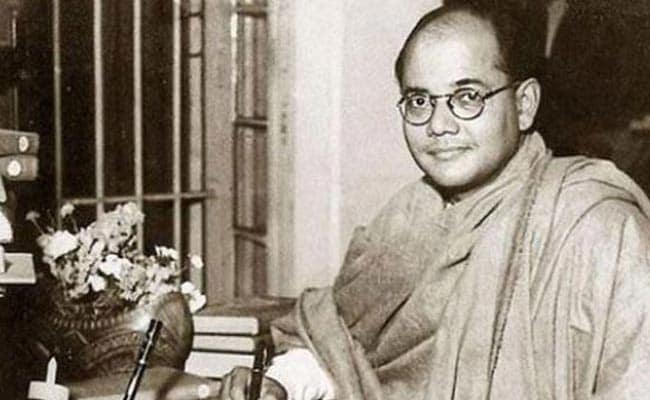
Early Years and Schooling
Netaji Subhas Chandra Bose came from a well-known Kayastha family with a history of public service. Janakinath Bose, his father, was a well-known lawyer, and Prabhavati Devi, his mother, was a progressive and pious woman. It was during these early demonstrations of leadership and resolve that Subhas Chandra Bose laid the groundwork for his eventual involvement in the struggle for India’s freedom.
Having come from a prosperous background, Netaji attended some of British India’s most esteemed educational establishments. At the age of five, he was accepted into the Protestant European School, also known as Stewart High School, in Cuttack in January 1902. Among the prestigious schools he attended to pursue his studies were Presidency College in Kolkata and Ravenshaw Collegiate School in Cuttack.
Bose, who attended Cambridge University, did well on the Indian Civil Service test but resigned from the esteemed administrative post because of his strong belief in the nation’s freedom. His choice was a reflection of the enduring dedication that would characterise his life and work.
Cracking Indian Civil Services (ICS) Exam
Netaji departed for London in 1919 in order to carry out a pledge he had given to his father regarding his preparation for and selection into the Indian Civil Services (ICS). Additionally, his father has set aside Rs 10,000 for his travel to and accommodations in London.
Netaji resided at Belsize Park in London with his brother Satish. He enrolled in Fitzwilliam College, part of the University of Cambridge, to study for Mental and Moral Sciences while he prepared for the ICS.
After being chosen for the Indian Civil Services Examination, Netaji left his position on April 23, 1921, and returned to India. He wrote a letter to his brother explaining his resignation from the ICS, citing his opposition to working for the British government. “On the soil of sacrifice and suffering can we raise our national edifice,” he added in the letter.
Contribution to Indian National Congress
Netaji Subhas Chandra Bose’s significant participation in the Indian National Congress preceded him into politics. He became a force to be reckoned with as a leader of the party, pushing for further steps towards total independence. In 1938 and 1939, Bose was elected President of the Indian National Congress, a pivotal year in India’s independence movement.
Under Bose’s leadership, the demand for “Purna Swaraj” (total independence) emerged as a key subject. However, he resigned from his position as president of the Congress due to ideological disagreements with Mahatma Gandhi and other leaders. Bose persisted in seeking independence through alternative means, unfazed.
The Forward Bloc’s Formation:
The Forward Bloc was a political organisation that Netaji Subhas Chandra Bose created in 1939 with the intention of bringing like-minded people together and advocating for a more aggressive strategy to secure India’s independence. Bose used the Forward Bloc as a platform to rally people behind his idea of a liberated and unified India.
International Efforts
His audacious 1941 escape from house imprisonment in Calcutta is considered one of the most famous moments of Netaji’s life. Bose travelled to Kabul and then Berlin while posing as a pathan in order to get support for India’s cause internationally during World War II. He founded the Free India Centre in Germany and later organised Indian prisoners of war to form the Indian Legion, which sided with the Axis powers.
An important stage in Netaji’s campaign to free India from British control was the alliance he formed with Japan and the establishment of the Indian National Army (INA). The INA was instrumental in the Burma Campaign, and soldiers fighting under Netaji’s command adopted the term “Jai Hind” as a rallying cry.
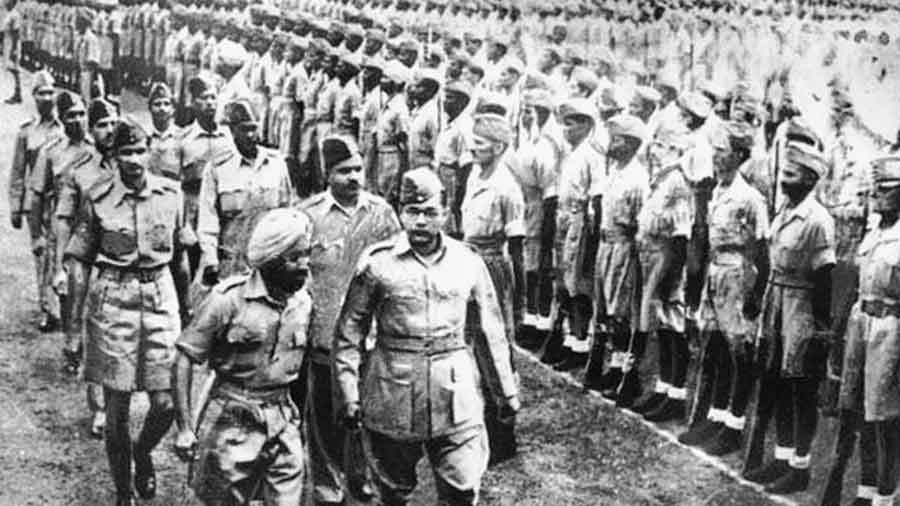
Even though the INA was never able to defeat the British on the battlefield, it demonstrated that Indians were prepared to fight for their independence by its sheer existence. Indians all around the world were inspired to believe in themselves and be defiant by Bose’s own audacious feats, which included his escape and his leadership of the INA.
Legacy and Disappearance
The freedom struggle in India benefited greatly from Netaji Subhas Chandra Bose, whose legacy lives on in the hearts of millions of people. Generations after generation have been inspired by his leadership, which is marked by a unique combination of bravery, strategic brilliance, and intense patriotism.
There is still ambiguity regarding the circumstances of Netaji’s death. Although the official story states that he perished on August 18, 1945, in a plane accident near Taipei, there are several competing explanations and disagreements regarding this occurrence. To Netaji’s already legendary stature, the mystery surrounding his disappearance lends an additional degree of fascination.
Honoring Netaji
Netaji Subhas Chandra Bose is regarded as one of the greatest heroes of independent India. On January 23, the day of his birth, people commemorate “Parakram Diwas” in his honour because of his bold leadership and steadfast dedication to the nation’s liberation. His memory is perpetuated by the Netaji Subhas Chandra Bose International Airport in Kolkata and the famous Netaji Bhawan in Delhi.
Conclusion
The life of Netaji Subhas Chandra Bose was a tale of selflessness, tenacity, and leadership that profoundly influenced the direction of India’s independence fight. His beliefs, ideals, and plan for a free and unified India still inspire and speak to the nation’s spirit. Netaji’s legacy, which represents the unwavering spirit of those who dared to dream of a free and sovereign nation, is still an essential component of India’s historical story.
Netaji Subhash Chandra Bose Paragraph for Class 5
Students from the early years of their school are encouraged to write about Netaji Subhash Chandra Bose. For this purpose, below we are providing students with the paragraph on the Netaji Subhash Chandra Bose for class 5 students.
One of the most well-liked Indian liberation fighters was the nationalist Subhas Chandra Bose. He was born on January 23, 1897, into a prosperous family in Cuttack, Odisha (which was then the Orissa Division of Bengal Province under the British Raj). Janakinath Bose was his father, while Prabhavati Dutt Bose was his mother.
He fought for freedom and was greatly impacted by Swami Vivekananda’s teachings. “Give me blood, and I shall give you freedom” is a famous remark he said.
Netaji participated actively in the Indian National Congress. In 1923, he won the All India Youth Congress presidential election. As a freedom fighter, his beliefs diverged greatly from Mahatma Gandhi’s. Gandhiji’s Non-Cooperation Movement included Netaji as a member. The Azad Hind Fauj was another name for Netaji’s Indian National Army. Early in 1942, Indian soldiers in Germany gave him the name Netaji. Ever since, he’s been referred to by the common name Netaji. On August 18, 1945, Netaji Subhas Chandra Bose perished in a plane crash in Taiwan.
Netaji Subhash Chandra Bose Essay in Hindi
Below we have provided an essay on Netaji Subhash Chandra Bose for students studying in the Hindi Medium.
परिचय
सुभाष चंद्र बोस (23 जनवरी 1897 – 18 अगस्त 1945) भारत के एक प्रसिद्ध स्वतंत्रता सेनानी थे जिनके गैर-समझौतावादी देशभक्तिपूर्ण रवैये ने उन्हें राष्ट्रीय नायक बना दिया। स्वतंत्रता के लिए समर्थन जुटाने में उनके असाधारण नेतृत्व गुणों ने उन्हें सम्मानित “नेताजी” का नाम दिया, जिसका हिंदी में अर्थ “सम्मानित नेता” है। सुभाष चंद्र बोस एक भारतीय राष्ट्रवादी थे जिनका भारतीय स्वतंत्रता और विकास में योगदान अतुलनीय है।
प्रारंभिक जीवन और शिक्षा
सुभाष चंद्र बोस का जन्म 23 जनवरी 1897 को दोपहर 12:10 बजे एक कायस्थ परिवार में हुआ था। उनकी माता का नाम प्रभावती दत्त बोस था और उनके पिता जानकीनाथ बोस थे, जो उस समय बंगाल प्रांत के अंतर्गत कटक, उड़ीसा में एक वकील थे।
एक संपन्न परिवार में जन्म लेने के कारण, नेताजी ने ब्रिटिश भारत के कुछ प्रतिष्ठित स्कूलों और संस्थानों में पढ़ाई की। जनवरी 1902 में पाँच वर्ष की आयु में, उन्हें स्टीवर्ट हाई स्कूल में भर्ती कराया गया; कटक (तब इसे प्रोटेस्टेंट यूरोपीय स्कूल कहा जाता था)।
कटक में रेवेनशॉ कॉलेजिएट स्कूल और कोलकाता में प्रेसीडेंसी कॉलेज कुछ प्रमुख संस्थान थे जहाँ उन्होंने अपनी शिक्षा को आगे बढ़ाने के लिए दाखिला लिया। वह अपने पूरे करियर के दौरान पढ़ाई में बहुत अच्छे थे।
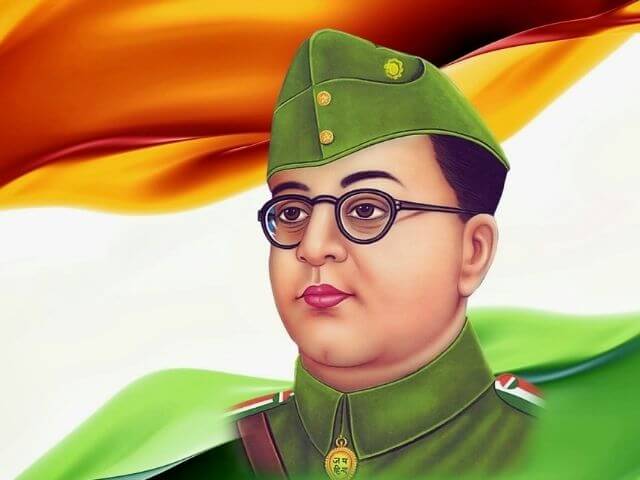
भारतीय सिविल सेवा (आईसीएस) उत्तीर्ण प्रक्रिया
वर्ष 1919 में, भारतीय सिविल सेवा (आईसीएस) में तैयारी करने और चयनित होने के बारे में अपने पिता से किये गये वादे को पूरा करने के लिए नेताजी लंदन चले गये। उनके पिता ने उनकी तैयारी और लंदन प्रवास के लिए 10,000 रुपये भी उपलब्ध कराए हैं।
नेताजी अपने भाई सतीश के साथ लंदन के बेलसाइज पार्क में रुके थे। उन्होंने कैंब्रिज विश्वविद्यालय के तहत फिट्ज़विलियम कॉलेज में मानसिक और नैतिक विज्ञान के लिए दाखिला लेते हुए आईसीएस की तैयारी की।
सुभाष का भारतीय सिविल सेवा परीक्षा में चयन हो गया, फिर भी उन्होंने 23 अप्रैल 1921 को अपनी नौकरी से इस्तीफा दे दिया और वापस भारत की ओर चल पड़े। आईसीएस से उनके इस्तीफे का कारण, जैसा कि उन्होंने अपने भाई को लिखे एक पत्र में बताया था, यह था कि वह ब्रिटिश सरकार के अधीन काम करने के विरोधी थे। पत्र में उन्होंने आगे कहा- ‘केवल बलिदान और पीड़ा की धरती पर ही हम अपनी राष्ट्रीय इमारत खड़ी कर सकते हैं।’
राजनीतिक जीवन
किशोरावस्था से ही सुभाष चन्द्र बोस रामकृष्ण परमहंस और स्वामी विवेकानन्द की शिक्षाओं और विचारों से बहुत प्रभावित थे। नेताजी के राष्ट्रवादी उत्साह का पहला संकेत तब दिखाई दिया जब उन्हें प्रोफेसर ओटेन पर हमला करने और भारतीय छात्रों पर नस्लीय टिप्पणियों के लिए कॉलेज से निष्कासित कर दिया गया।
आईसीएस से इस्तीफा देकर, बोस भारत वापस आ गए और पश्चिम बंगाल में “स्वराज” समाचार पत्र शुरू किया। उन्होंने बंगाल प्रांत कांग्रेस कमेटी के प्रचार का कार्यभार भी संभाला। इसके बाद 1923 में, बोस को अखिल भारतीय युवा कांग्रेस के अध्यक्ष और बंगाल राज्य कांग्रेस के सचिव के रूप में भी चुना गया।
1927 में, सुभाष चंद्र बोस को कांग्रेस पार्टी के महासचिव के रूप में नियुक्त किया गया और उन्होंने पं. जवाहरलाल नेहरू के साथ मिलकर भारत की आजादी के लिए काम किया।
द्वितीय विश्व युद्ध और भारतीय राष्ट्रीय सेना
द्वितीय विश्व युद्ध के दौरान, बोस ने अंग्रेजों के खिलाफ अपनी लड़ाई में धुरी शक्तियों (जर्मनी, इटली और जापान) से मदद मांगी। उन्होंने जर्मनी की यात्रा की और भारत की स्वतंत्रता के लिए सैन्य सहायता और समर्थन की मांग करते हुए एडॉल्फ हिटलर से मुलाकात की। 1943 में, उन्होंने जापान की यात्रा की और भारतीय राष्ट्रीय सेना (INA) का गठन किया, जो युद्ध के भारतीय कैदियों और दक्षिण पूर्व एशिया में रहने वाले प्रवासियों से बना एक सैन्य बल था। बोस का नेतृत्व और आईएनए के प्रयास भारतीय स्वतंत्रता आंदोलन में प्रमुख कारक थे और उन्होंने भारतीय लोगों के बीच स्वतंत्रता के लिए समर्थन जुटाने में मदद की।
सुभाष चंद्र बोस की विरासत
बोस एक ऐसे व्यक्ति थे जो अपने लक्ष्यों को प्राप्त करने के लिए किसी भी हद तक जाने को तैयार थे, और उनके समर्पण और बलिदान ने लाखों भारतीयों को अपनी स्वतंत्रता के लिए लड़ने के लिए प्रेरित किया। वह एक दूरदर्शी व्यक्ति थे जिन्होंने स्वतंत्र और स्वतंत्र भारत की संभावना देखी और इसे हासिल करने के लिए कुछ भी करने को तैयार थे।
दुर्भाग्य से, भारत को ब्रिटिश शासन से आजादी मिलने से कुछ महीने पहले, 1945 में एक विमान दुर्घटना में बोस की मृत्यु हो गई। आज, बोस को भारत में एक नायक के रूप में याद किया जाता है और नाम हमेशा भारतीय स्वतंत्रता के संघर्ष का पर्याय रहेगा, और उनके बलिदान और समर्पण को आने वाली पीढ़ियों के लिए याद किया जाएगा।
नेताजी सुभाष चंद्र बोस का सम्मान
स्वतंत्र भारत नेताजी सुभाष चंद्र बोस को अपने सबसे महान नायकों में से एक मानता है। उनके निडर नेतृत्व और देश की आजादी के प्रति अटूट प्रतिबद्धता का सम्मान करने के लिए उनके जन्मदिन, 23 जनवरी को “पराक्रम दिवस” के रूप में मनाया जाता है। कोलकाता में नेताजी सुभाष चंद्र बोस अंतर्राष्ट्रीय हवाई अड्डा और दिल्ली में प्रतिष्ठित नेताजी भवन उनकी विरासत को स्थायी श्रद्धांजलि के रूप में खड़े हैं।
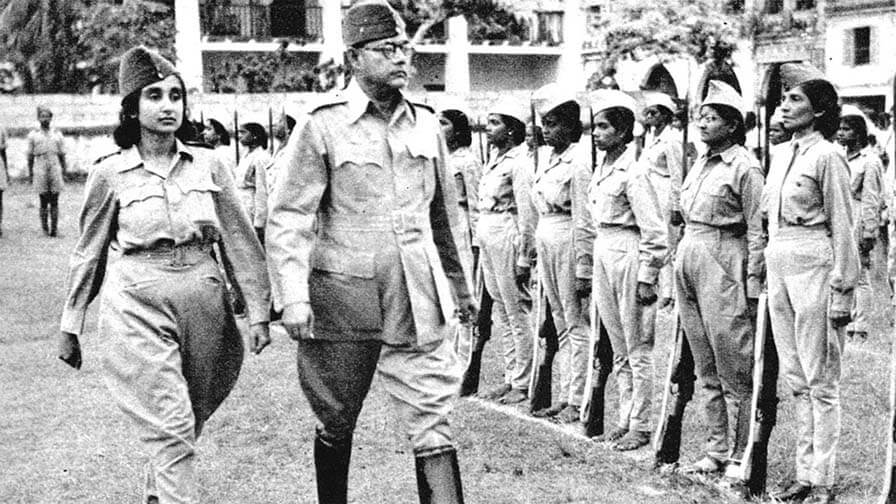
निष्कर्ष
नेताजी सुभाष चंद्र बोस एक श्रद्धेय स्वतंत्रता सेनानी और देशभक्त थे, जिन्होंने भारत की आजादी की लड़ाई के लिए समर्थन जुटाने के लिए दुनिया भर में अभियान चलाया। उनकी उद्दंड देशभक्ति को भारतीय राजनीतिक हलकों में हमेशा पसंद नहीं किया गया और यह अक्सर उनकी कुछ राजनीतिक असफलताओं का कारण बनी। हालाँकि नेता जी दिल से एक सैनिक थे, लेकिन मातृभूमि की आज़ादी के लिए लड़ते हुए वे एक सैनिक की तरह जिए और एक सैनिक की तरह ही मर भी गए।

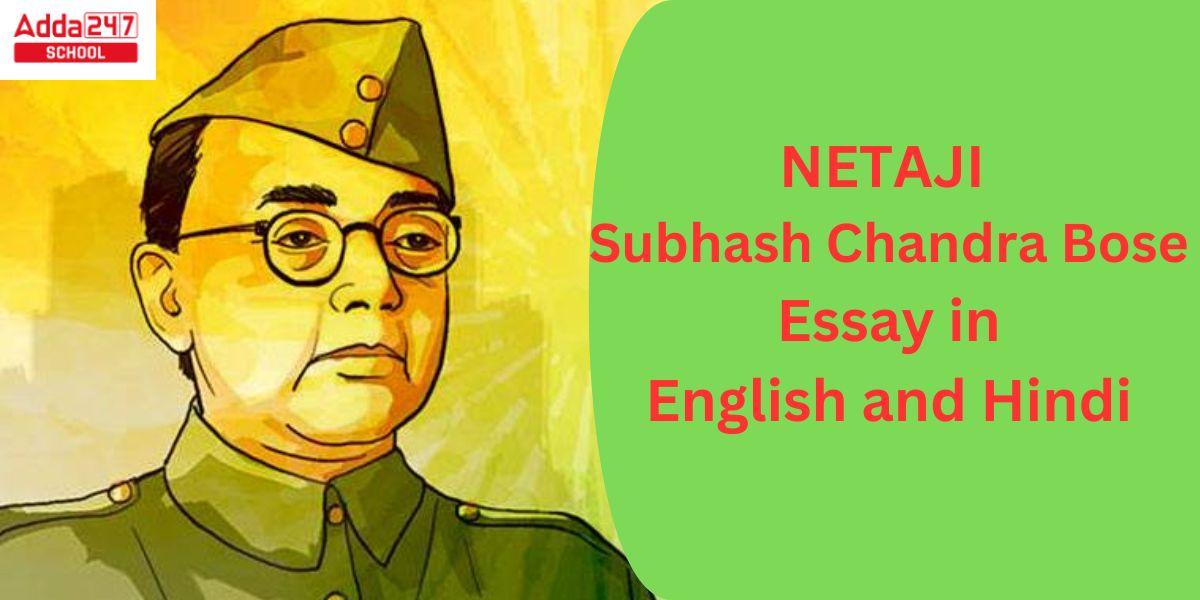












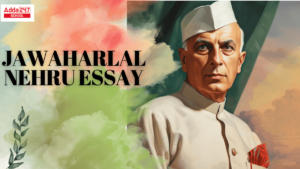 Jawaharlal Nehru Essay for Students, Dow...
Jawaharlal Nehru Essay for Students, Dow...
 बाल दिवस पर निब�...
बाल दिवस पर निब�...
 My Best Friend Essay in English, Best Fr...
My Best Friend Essay in English, Best Fr...









